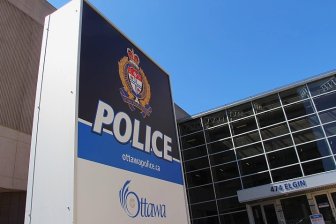Jay Jones’s understanding of the multi-generational trauma caused by residential schools runs deep.

The son of survivors who attended Shingwauk Residential School in Sault Ste. Marie, Ont., Jones said he has dedicated his life to the pursuit of truth.
“These were all children. My mom was four-and-a-half, playing on her front yard, and a car pulls up. Two men walk up, one grabs her, one grabs her brother and they drive away,” he told Global News.
“Just multiply that by 150,000 children, and that number is probably inaccurate — it’s probably more than that.”
The discovery of the remains of 215 children at the site of a former residential school in Kamloops, B.C., has conjured grief, emotional exhaustion, and a renewed determination to unearth the truth.
Earlier in the week, Algoma University, along with several of its partners, released a statement acknowledging the discovery of unmarked burial sites in British Columbia.
“In light of what we have learned through the Tk’emlúps te Secwépemc announcement at the Kamloops Residential School, we are taking every measure, including the use of technology available to us today, to address the potential that there may be burial sites outside the marked gravesites in the Shingwauk Cemetery,” read a statement on Algoma University’s website.
“The elders have always said there are other gravesites outside the cemetery,” said Jones, president of the Children of Shingwauk Alumni Association.
Shingwauk Hall has been a central part of the Algoma University campus. It was established as a residential school in 1873 and remained open for roughly a century.
“Keep speaking up,” said Krista McCracken, director of the Shingwauk Residential Schools Centre, when asked what advice she would offer survivors.
“That’s why the Shingwauk Residential Schools Centre and the Children of Shingwauk Alumni Association came together … It was because they realized the survivor perspective wasn’t being shared.”
Jeffrey Schiffer, the executive director of Native Child and Family Services of Toronto, said a deeper conversation has now been spawned about awareness and understanding and the role of education.
“We have an opportunity to turn tragedy into action here, and we have a long history in Canada, of responding to things like this with inquiries and reports and conversations, and I’m really hoping that we move beyond conversation and into concrete action,” he said.
Schiffer told Global News it is vital that children and youth grow up understanding the full magnitude of Canada’s colonial history.
“I think people forget that colonization isn’t simply a feature of the past. It’s a ubiquitous feature of the present. We are still, in fact, living in the aftermath and inter-generational impact of residential schooling and mainstream child welfare.”
A spokesperson for Ontario Education Minister Stephen Lecce wrote in part in an email to Global News, that the government is committed to educating students about Indigenous history.
Learning about First Nation, Métis, and Inuit perspectives, cultures, contributions and histories became mandatory for students in grades 4 to 8, and Grade 10 in 2019.
“We are in consistent dialogue with our Indigenous partners on how we can continue to embed Indigenous learning and perspective into our schools and to further build upon this mandatory learning,” the statement read.
Education is among the 94 Truth and Reconciliation Commission of Canada calls to action.
Tanya Senk is the system superintendent of Indigenous education with the largest school board in Canada, the Toronto District School Board, and she is one of the 19 staff members who work to support students and colleagues.
“There cannot be reconciliation without truth. That Indigenous education is made mandatory within the curriculum across the country — not just within Ontario,” she explained.
Anyone experiencing pain or distress as a result of their residential school experience can access a 24-hour, toll-free and confidential National Indian Residential School Crisis Line at 1-866-925-4419.
© 2021 Global News, a division of Corus Entertainment Inc.
Calls grow for more education about Indigenous culture, history in Ontario - Global News
Read More



No comments:
Post a Comment